Combating Racism – Honoring Women’s History Month – Part 5
This week I wrap up my Women’s History Month newsletters with the stories of four contemporary Black women whose achievements are remarkable and who have paved the way for others to follow in their footsteps.
KIZZMEKIA CORBETT (1986 – )
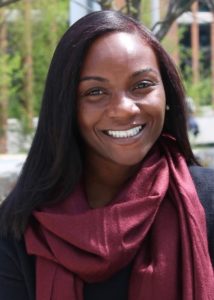
Kizzmekia “Kizzy” Shanta Corbett was born in Hurdle Mills, North Carolina in January,1986 and grew up in Hillsborough, North Carolina. She went to Oak Lane Elementary School in Roxboro and A.L. Stanback Middle School in Hillsborough. Her fourth grade teacher recognized her talent at an early age and encouraged her mother to place her in advanced classes.
In the tenth grade, Corbett was picked for a summer program aimed at minority students, interning in chemistry labs at the University of North Carolina (UNC) at Chapel Hill. She earned her undergraduate degree in biological sciences and sociology at the University of Maryland, Baltimore County (UMBC) in 2008. She returned to UNC Chapel Hill for her graduate work, researching antibody responses to the dengue virus for her Ph.D. in microbiology and immunology. After graduating, Corbett became a research fellow at the National Institutes of Health (NIH).
Prior to the pandemic, Corbett was part of a team at NIH whose research on other coronaviruses laid the foundation for the design of the COVID-19 vaccine. A senior research fellow in NIAID’s vaccine development unit, Corbett focused on viral diseases including dengue, respiratory syncytial virus, and recent coronaviruses such as MERS. She has been at the forefront of the development of a highly effective vaccine to protect against COVID-19. These early efforts were pivotal to the unprecedented speed with which their COVID-19 vaccine was developed in collaboration with the biotech company Moderna.
When Corbett and her colleagues in the Vaccine Research Center at NIH’s National Institute of Allergy and Infectious Diseases (NIAID) unveiled their molecular prototype in January 2020, mRNA-1273 became a gamechanger. It would soon be better known as the Moderna COVID-19 vaccine, one of two revolutionary messenger RNA vaccines to emerge from laboratories in record time to fight the COVID-19 pandemic.
A week after her lab produced mRNA-1273, Kizzmekia Corbett turned 34. Within a year, two sitting presidents would drop by her lab for briefings. Her top boss at NIAID, Anthony Fauci, would call her a “rising star.”
Corbett’s lab is now pursuing work on a universal coronavirus vaccine that would use mRNA to alert the immune system to features fundamental to all members of the coronavirus family. The Vaccine Research Center is also at work developing novel therapeutic uses for the antibodies triggered by SARS-CoV-2 infection.
Dr. Corbett uses her viral immunology expertise to propel novel vaccine development for pandemic preparedness. The vaccine concept incorporated in mRNA-1273 was designed by Dr. Corbett’s NIH team from viral sequence and rapidly deployed to industry partner, Moderna, Inc., for Phase 1 clinical trial, which unprecedently began only 66 days from viral sequence release. Alongside mRNA-1273, Dr. Corbett boasts a patent portfolio which also includes universal coronavirus and influenza vaccine concepts and novel therapeutic antibodies. In all, she has over 15 years of experience studying dengue virus, respiratory syncytial virus, influenza virus, and coronaviruses.
Corbett is not only a renowned immunologist, she is a powerful voice bringing awareness to racial health disparities and encouraging trust in science. She has taken on a prominent role as a vaccine educator, reaching out especially to communities of color, which have been disproportionately impacted by COVID-19 and have long suffered from healthcare disparities. As one of the most highly visible Black scientists in the fight against COVID-19, Corbett feels she has a special role. She works to bridge the gap between vaccine science and public understanding by explaining the science to address people’s concerns. “For a long time, we left the general public on the outside of vaccine development, until it was time to give them their shot. And that’s just unacceptable. I can’t even blame anyone for being skeptical about this, because they don’t have any idea what went into it,” Corbett said in an interview with Nature. To get the word out, she often virtually meets with church and school groups, engages with news media outlets, and creates online videos. Corbett also volunteers her time in schools as a role model for children from under-resourced communities, encouraging them to pursue careers in science, technology, engineering, and math (STEM).
She is currently Assistant Professor of Immunology and Infectious Diseases at the Harvard T. H. Chan School of Public Health.
Corbett has garnered a number of prestigious honors, including the Key of Life Award from the NAACP (2021), the Scroll of Merit Award from the National Medical Association (2021), the Salzman Memorial Award in Virology from the Foundation for National Institutes of Health (2020), the Clinton Global Citizen Award from the Clinton Foundation (2021), the Early Career Applied and Biotechnological Research Award from the American Society for Microbiology (2020) to name just a few. She also received a Benjamin Franklin NextGen Award in 2021 for her “outstanding contributions to the field of viral immunology and vaccine development, including an mRNA-based vaccine to combat the novel coronavirus SARS-CoV-2, cause of the COVID-19 pandemic.
AVA DuVERNAY (1972 – )
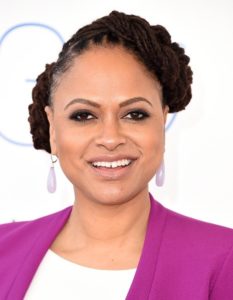
Ava DuVernay was born on August 24, 1972 in Long Beach, California. As a child, DuVernay’s Aunt Denise encouraged her passion for art and creativity. Her aunt worked the night shift as a nurse so she could pursue her love for art, literature and theater during the day. She introduced DuVernay to the 1961 film West Side Story, and DuVernay fell in love with it. Similarly, DuVernay’s mother was socially conscious and taught her to “say something through the arts.” DuVernay learned by example that art could be a vehicle for activism.
Although DuVernay grew up in Compton with her family, she would travel during her summer vacations to visit her father in Lowndes County, Alabama where her father’s family had lived for generations. DuVernay’s father recalled watching the historic civil rights march over the Edmund Pettus Bridge in the neighboring town of Selma, Alabama. The summers DuVernay spent there would later inspire her to make Selma, a movie about Dr. Martin Luther King, Jr. and the Civil Rights Movement.
In 1990, DuVernay graduated from Saint Joseph High School in Lakewood, California. At the University of California, Los Angeles, she earned degrees in English and African American studies. While still a student, DuVernay became interested in producing for broadcast journalism, a choice influenced by an internship with CBS News during the O.J. Simpson trial when she worked as a junior publicist at 20th Century Fox, Savoy Pictures, and other PR agencies.
Her tasks left her disillusioned with journalism, so she decided to move into public relations. DuVernay was hired right out of college as a junior publicist at a small studio. From this position, she started her own public relations company called The DuVernay Agency in 1999.
The DuVernay Agency worked on campaigns for movies and television shows. While on film sets, DuVernay was able to observe prominent filmmakers like Steven Spielberg, Michael Mann, Clint Eastwood, Raoul Peck, and Gurinder Chadha. She became interested in directing and started writing her first script in 2003. By 2006, DuVernay made her first short film called Saturday Night Life based on her mother’s experiences. The 12-minute film was about an uplifting trip by a struggling single mother and her three kids to a local Los Angeles discount grocery store. The film was broadcast on February 6, 2007, as part of Showtime’s Black Filmmaker Showcase.
The next year, she made her first documentary called Compton in C Minor.
A more cost-effective style of film, DuVernay’s next project was a documentary that she wrote, produced, and directed called This Is the Life about hip hop culture. This is the Life won audience awards at four different film festivals.
In 2010, DuVernay released her first narrative feature film called I Will Follow. This film became the official selection of the American Film Institute Fest, Pan-African Film Festival, and the Chicago International Film Festival. Roger Ebert called it “one of the best films I’ve seen about coming to terms with the death of a loved one.” After I Will Follow, DuVernay fully left her job in publicity.
Her second feature film, Middle of Nowhere, premiered at the 2012 Sundance Film Festival and won the award for Best Direction. DuVarney was the first Black woman to win the prize. This film shows the ways incarceration infiltrates the lives of those who are closely associated with someone who is incarcerated—particularly Black women, as a vast majority of America’s prisoners are Black and male. Burdens of carceral care fall most heavily on those intimately tied to the incarcerated as partners, spouses, parents, and children–demographics that are often marginalized.
DuVernay’s career quickly took off following this film. In addition to directing many TV shows, commercials, and music videos, DuVernay’s next films received critical acclaim and multiple awards for their portrayal of racial prejudice in the United States. DuVernay directed Selma, about the Rev. Dr. Martin Luther King, Jr. and the 1965 Selma to Montgomery march for voting rights. For her work on Selma (2014), DuVernay became the first Black woman to be nominated for a Golden Globe Award for Best Director, and also the first Black female director to have her film nominated for the Academy Award for Best Picture.

DuVernay was commissioned by the Smithsonian’s National Museum of African American History and Culture to create a film about African-American history. Her 22-minute film, August 28: A Day in the Life of a People, explores six historical events that happened on the same date, August 28, in different years. It debuted at the museum’s opening on September 24, 2016.
In July 2016, the New York Film Festival made the surprise announcement that 13th, a documentary directed by DuVernay, would open the festival. Centered on race in the U.S. criminal justice system, the film is titled after the Thirteenth Amendment to the U.S. Constitution, which outlawed slavery (except as punishment for a crime). DuVernay’s documentary argues that slavery has been effectively perpetuated in the U.S. through disproportionate mass incarceration of people of color.
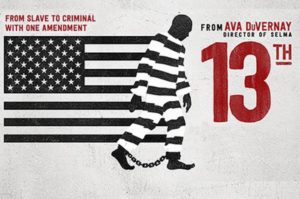
13th garnered acclaim from film critics and in 2017, was nominated for an Academy Award for Best Documentary Feature at the 89th Oscars. DuVernay became the first Black woman to be nominated by the academy as a director in a feature category. The film also won a Peabody Award in 2017 and a Columbia Journalism School DuPont Award in 2018.

Duvernay with her Peabody Award for 13th at the 76th annual ceremony in 2017
She collaborated with Oprah Winfrey to create and direct the TV series Queen Sugar on the Oprah Winfrey Network. In Queen Sugar one of the primary characters “is a convicted felon whose prison past makes it difficult for him to find a job and puts an ongoing strain on his relationship with his family. Queen Sugar premiered September 6, 2016 to critical acclaim and positive reviews. The show, currently in its sixth season, has won 19 awards and 61 nominations.
In 2010, Disney announced it would carry the film rights to Madeleine L’Engle’s 1962 novel A Wrinkle in Time which follows a young girl traveling through space and time. In directing A Wrinkle in Time, DuVernay became the first woman of color to direct a live-action film with a budget of over $100 million, and the second woman to do so after Patty Jenkins (who directed Wonder Woman). A Wrinkle in Time made the list for the top 100 grossing movies of 2018, making Ava DuVernay one of four female directors that made the list that year.
In 2019, DuVernay created, directed, and co-wrote the Netflix drama When They See Us. This five-part miniseries based on the 1989 Central Park jogger case quickly became Netflix’s number one most watched series daily in the U.S., with over 23 million viewers during its first month of release, 16 Emmy nominations at the 71st Primetime Emmy Awards, and won the Critics Choice Television Award for Best Limited Series.
Since May 2019, DuVernay has cohosted The Essentials, a weekly film series on Turner Classic Movies, with Ben Mankiewicz.
In 2010, DuVernay directed three TV documentaries. The first, two-hour concert film TV One Night Only: Live from the Essence Music Festival, showcases the U.S.’s largest annual African-American entertainment gathering, the Essence Music Festival. On Thanksgiving 2010, DuVernay’s 44-minute documentary Essence Presents: Faith Through the Storm was aired, about two Black sisters who reclaimed their lives after personal devastation during Hurricane Katrina. DuVernay produced and directed Venus Vs., a documentary on Venus Williams’s fight for equal prize money.
In October 2020, Netflix announced that DuVernay will write, direct and produce, Caste, an adaptation of Isabel Wilkerson’s book.
In 2021, she created an autobiographical miniseries with former NFL player Colin Kaepernick, titled Colin in Black & White, centering on Kaepernick’s youth and various events in his life that has led him to be the activist he is today.
DuVernay has two primary areas of interest: the first, exploring the intricacies of the Black American family, particularly Black women’s role within the family and within a racist, patriarchal society. The second, is exploring the injustices that have affected, and have continued to affect, Black families and communities throughout history. DuVernay has made it a focus of her activist filmmaking to center Black women in her work.One of the social issues that DuVernay repeatedly returns to in her work is mass incarceration and the effects of incarceration on Black communities.
Although she did not pick up a camera until she was thirty-two, Ava DuVernay has made history as a writer, director, and producer. In 2017, DuVernay was included on the annual Time 100 list of the most influential people in the world.
ALICIA GARZA (1981 – )
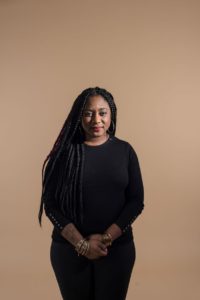
Alicia Garza was born to a single Black mother in Oakland, California, on January 4, 1981. Her first four years were spent in San Rafael. After that she lived with her mother and her Jewish stepfather, and grew up as Alicia Schwartz in a mixed-raced and mixed-religion household. Garza identifies as Jewish. The family lived first in San Rafael and then Tiburon, and ran an antiques business.
When she was 12 years old, Garza engaged in activism, promoting school sex education about birth control. Enrolling in the University of California, San Diego (UCSD), she continued her activism by working at the student health center and joining the student association calling for higher pay for the university’s janitors. In her final year at college, she helped organize the first Women of Color Conference, a university-wide convocation held at UCSD in 2002. She graduated in 2002 with a degree in anthropology and sociology.
In 2003 Garza returned to the Bay Area, where she began a training program in political education with the School of Unity and Liberation (SOUL) that taught young people of color how to organize, by placing them with local community based organizations in West Oakland.
Completing her internship at SOUL, Garza campaigned with People United for a Better Life in Oakland (PUEBLO) to gather community resistance in East Oakland against a proposed Walmart. PUEBLO was unable to win and in 2005, the first Walmart opened in that area.
After leaving PUEBLO, Garza began working with the UC Student Association promoting activism to university students. In 2005 she joined People Organized to Win Employment Rights (POWER) in Bayview–Hunters Point, a multi-racial and multi-lingual grassroots organization of Blacks and Latinas committed to winning economic, environmental, racial, and gender justice. The organization was committed to building the collective strength of working-class families to control the destinies of their communities and workplaces. While serving as the director of POWER in the San Francisco Bay Area, Garza won the right for youth to use public transportation for free in San Francisco, and campaigned against gentrification and police brutality in the area.
On July 13, 2013, after the acquittal of George Zimmerman in the death of Trayvon Martin, Garza posted on Facebook the message that sparked the Black Lives Matter movement:
stop saying we are not surprised. that’s a damn shame in itself. I continue to be surprised at how little Black lives matter. And I will continue that. stop giving up on Black life. Black people. I love you. I love us. Our lives matter.
Patrisse Cullors shared this with the hashtag #BlackLivesMatter. The organization Black Lives Matter was spurred on by the killings of Black people by police, racial disparities within the U.S. criminal legal system, mass incarceration, police militarization, and over-criminalization. Garza’s post became popularized after protests emerged in Ferguson, Missouri, following the death of Michael Brown.
Garza led the 2015 Freedom Ride to Ferguson that launched the building of BlackLivesMatter chapters across the United States and the world. However, she does not think of the Black Lives Matter Movement as her creation; she feels her work is only a continuation of the resistance led by Black people in America. The movement and Garza are credited for popularizing the use of social media for mass mobilization in the United States; a practice called “mediated mobilization.” This practice has been used by other movements, such as the #MeToo movement.
On April 10, 2020 Garza debuted her podcast, Lady Don’t Take No, named after the song ”Lady Don’t Tek No” by Latyrx. Her first book, The Purpose of Power: How We Come Together When We Fall Apart, was published in October 2020 by Penguin Random House. Described as “an essential guide,” the book tells Garza’s story as an activist and shares lessons for future activists.
Below is an excerpt from The Purpose of Power:
We can’t be afraid to establish a base that is larger than the people we feel comfortable with. Movements and bases cannot be cliques of people who already know each other. We have to reach beyond the choir and take seriously the task of organizing the unorganized—the people who don’t already speak the same language, the people who don’t eat, sleep and breathe social justice, the people who have everything at stake and are looking to be less isolated and more connected and who want to win changes in their lives and the lives of the people they love.
According to Garza, “My experience with BLM toughened my skin and softened my heart. I wanted to humanize the movement.”
Garza is an active participant in several Bay Area social movement groups. She is on the board of directors of Forward Together’s Oakland California branch and is also involved with Black Organizing for Leadership and Dignity. She is also on the board of directors for Oakland’s School of Unity and Liberation (SOUL).
In 2018 Garza launched Black Futures Lab, whose goal is to engage with advocate organizations to advance policies that make Black communities stronger. The first project for Black Futures Lab was the Black Census Project. This project was the largest survey on Black People since the Reconstruction era of the United States. The survey included questions on subjects such as political attitudes, organization affiliation, experiences with racism and police violence, perceptions of social movements, access to healthcare and economic well-being. Black Future Labs plans to use the results of the Black Census Project to determine pressing legislative and policy issues.
Garza has organized around the issues of health, student services and rights, rights for domestic workers, ending police brutality, anti-racism, and violence against transgender and gender non-conforming people of color. She currently directs Special Projects at the National Domestic Workers Alliance, the nation’s leading voice for dignity and fairness for the millions of domestic workers in the United States, and is the Principal at the Black Futures Lab.
Garza has received many awards for her organizing work, including the Root 100 2015 list of African-American achievers and influencers. She is now the 27th most influential Black American (behind her counterpart, Patrisse Cullors) on the Root 100, an annual list of Black influencers. She was also featured in the Politico50 guide to the thinkers, doers and visionaries transforming American politics in 2015. She lives and works in Oakland, California.
To view Garza’s November 1026 TED talk about the beginnings of the Black Lives Matter movement, click here.
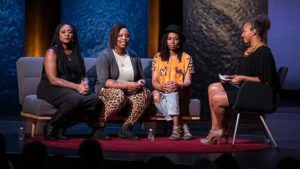
Alicia Garza, Patrisse Cullors and Opal Tometi, founders of Black Lives Matter, November 29 2016
DR. MAE JEMISON (1956 – )
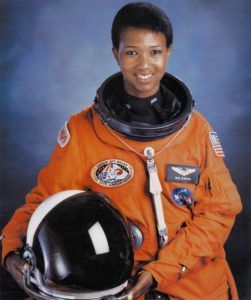
Science & Society Picture Library via Getty Images
Mae Carol Jemison was born on October 17, 1956 in Decatur, Alabama. The youngest of three children, her mother was an elementary school teacher and her father was a maintenance supervisor. A few years after she was born, Jemison and her family moved to Chicago, Illinois. At a very young age, Jemison knew that she wanted to study science. She grew up watching the Apollo airings on TV, but she was often upset that there were no female astronauts. However, Jemison was inspired by Black actress Nichelle Nichols who played Lieutenant Uhura on the Star Trek television show and she was determined to one day travel in space.
In 1973, she graduated from Morgan Park High School when she was 16 years old. She then left Chicago to attend Stanford University in California. As one of the only Black students in her class, Jemison experienced racial discrimination in school. She later served as president of the Black Student Union and choreographed a performing arts production called Out of the Shadows about the Black experience. Jemison graduated in 1977 with a Bachelor of Science degree in Chemical Engineering and a Bachelor of Arts degree in African and African-American studies. After graduating from Stanford, Jemison attended Cornell Medical School. While in medical school, she traveled to Cuba to lead a study for the American Medical Student Association. She also worked at a Cambodian refugee camp in Thailand. Jemison graduated from Cornell with a Doctorate in Medicine in 1981 and shortly thereafter became an intern at the Los Angeles County Medical Center. She went on to practice general medicine. Fluent in Russian, Japanese and Swahili, Jemison joined the Peace Corps in 1983 and served as a medical officer for two years in Africa.
After working with the Peace Corps, Jemison opened a private practice as a doctor. However, once Sally Ride became the first American woman in space in 1983, Jemison decided to apply to the astronaut program at NASA. She applied in 1985, but after the Space Shuttle Challenger exploded in 1986, NASA stopped accepting new people. Jemison applied again in 1987 and was one of the 15 people chosen out of over 2,000 applications. She was selected for NASA Astronaut Group 12, which was the first group chosen after the Challenger explosion. Jemison trained with NASA and worked on projects at the Kennedy Space Center in Florida and the Shuttle Avionics Integration Laboratory. She received her first mission on September 28, 1989 when she was selected to join the STS-47 crew as a Mission Specialist. On September 12, 1992 Jemison and six other astronauts went into space on the space shuttle Endeavor. This voyage made Jemison the first Black American woman in space. The team made 127 orbits around the Earth and returned to the Kennedy Space Center in Florida on September 20, 1992.
Jemison left NASA in 1993 after serving as an astronaut for six years.. She started The Jemison Group, a consulting company that encourages science, technology, and social change. She also taught environmental studies at Dartmouth College from 1995 to 2002 where she directed the Jemison Institute for Advancing Technology in Developing Countries. After hearing that she was a fan of the Star Trek television show, actor LeVar Burton asked Jemison to appear in an episode. She agreed and became the first real astronaut to be on an episode of Star Trek: The Next Generation. She played Lieutenant Palmer in the episode, “Second Chances.” In 1994, Jemison created an international space camp for students 12-16 years old called The Earth We Share (TEWS). She also created a nonprofit organization called the Dorothy Jemison Foundation for Excellence, named for her mother. Jemison accepted a position as the Andrew D. White Professor-at-Large at Cornell University in 1999. She went on to write her first book in 2001, Find Where the Wind Goes, a children’s book about her life.
Currently, Jemison is leading the 100 Year Starship project through the United States Defense Advanced Research Projects Agency (DARPA). This project works to make sure human space travel to another star is possible within the next 100 years. She also serves on the Board of Directors for many organizations including; the Kimberly-Clark Corp., Scholastic, Inc., Valspar Corp., Morehouse College, Texas Medical Center, Texas State Product Development and Small Business Incubator, Greater Houston Partnership Disaster Planning and Recovery Task Force, and the National Institute of Biomedical Imaging and Bioengineering.
Jemison is a member of the National Academy of Sciences’ Institute of Medicine, and has been inducted into the National Women’s Hall of Fame, National Medical Association Hall of Fame, the International Space Hall of Fame, and Texas Science Hall of Fame. She has received multiple awards and honorary degrees including the National Organization for Women’s Intrepid Award and the Kilby Science Award. She currently lives in Houston, Texas.
~ ~ ~ ~ ~ ~ ~ ~ ~ ~ ~ ~ ~ ~ ~ ~ ~ ~ ~ ~ ~ ~ ~ ~ ~ ~ ~ ~ ~ ~
WHAT CAN YOU DO?
As Women’s History Month comes to a close, I hope you will remember these names. Speak of them to children, educators, friends, and colleagues, lest they remain forgotten. And think about other Black women trailblazers whose names I have neglected to mention in this past month’s newsletters. Send their names on to me so I can recognize them and share their stories going forward.
And to all the courageous, trailblazing women I know, I hope your history has also been honored this month.
~ ~ ~ ~ ~ ~ ~ ~ ~ ~ ~ ~ ~ ~ ~ ~ ~ ~ ~ ~ ~ ~ ~ ~ ~ ~ ~ ~ ~ ~
I’m excited to share the news: my memoir, A Daughter’s Kaddish: My Year of Grief, Devotion, and Healing will be published this fall by Wonderwell Publishing. Watch for more information to come.